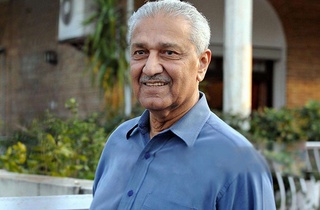According to local reports, Khan died in an Islamabad hospital where he was admitted after he experienced discomfort in breathing. He reportedly died due to lung problems.
Abdul Qadeer Khan, known as A. Q. Khan, was a Pakistani nuclear physicist and metallurgical engineer who is colloquially known as the “father of Pakistan's atomic weapons program”.
Though, Khan is celebrated in Pakistan for bringing balance to the South Asian region after India's nuclear tests; he is also noted for both his scientific ability and his difficult interpersonal relations.
An émigré from India who migrated to Pakistan in 1951, Khan was educated in Western Europe's technical universities from metallurgical engineering department where he pioneered studies in phase transitions of metallic alloys, uranium metallurgy, and isotope separation based on gas centrifuges.
After learning of India's 'Smiling Buddha' nuclear test in 1974, Khan joined his nation's clandestine efforts to develop atomic weapons when he founded the Khan Research Laboratories (KRL) in 1976 and was both its chief scientist and director for many years. (ILKHA)



 Güncel
Güncel
 Güncel
Güncel
 Güncel
Güncel
 Dünya
Dünya
 Dünya
Dünya
 Güncel
Güncel
 Güncel
Güncel
 Güncel
Güncel
 Güncel
Güncel
 Dünya
Dünya





